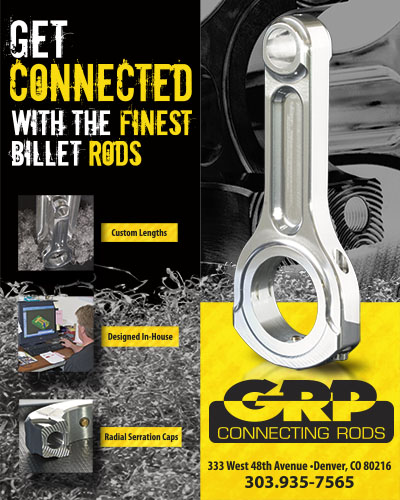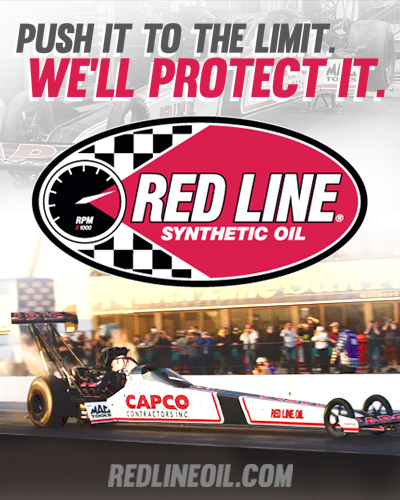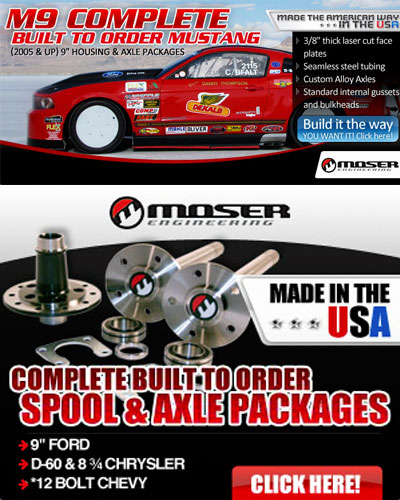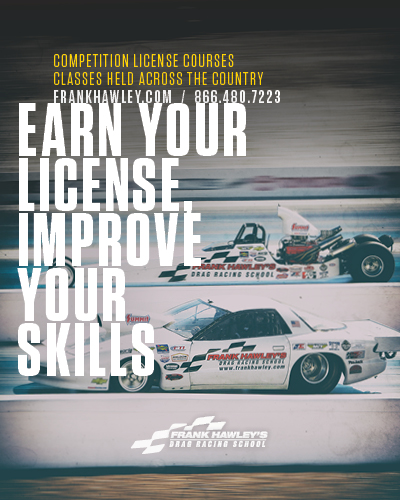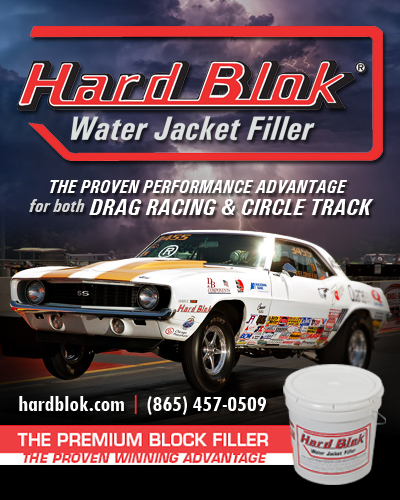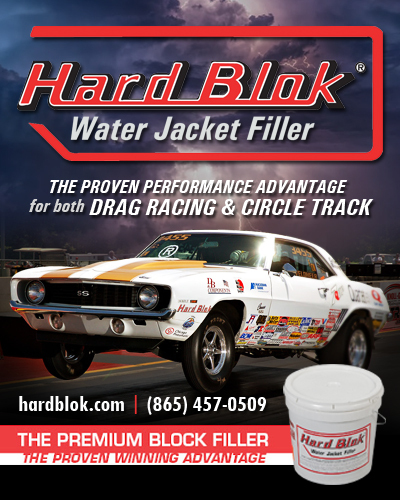FAST FIVE WITH DICK LAHAIE
Tue, 2008-05-20 16:28
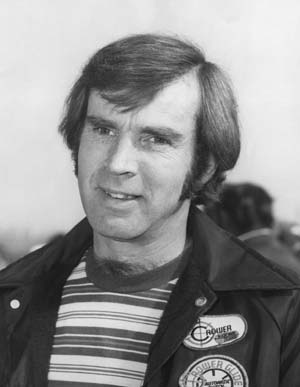 Dick LaHaie was arguably the most humble, yet fiercest competitor around.
Selected No. 31 on the NHRA's all-time Top 50 drivers list, it's no surprise the
Lansing, Mich. racer/owner/crew chief was named Grand Marshal of the 6th annual
Holley National Hot Rod Reunion, June 13-15, Beech Bend Raceway Park. LaHaie has
proven himself worthy of numerous honors, and is a member of The Drag Racing
Hall of Fame. In a career that has spanned nearly 50 years, LaHaie won The NHRA
Top Fuel championship as a driver in 1987 and as the crew chief for Scott
Kalitta in 1994 and 1995. LaHaie joined Don Prudhomme Racing and guided Top Fuel
ace Larry Dixon to NHRA Top Fuel world championships in 2003 and 2004. LaHaie
retired as Dixon's crew chief following the 2005 NHRA season but decided in 2007
to return as a tuning consultant for Kalitta Motorsports. In addition to his
professional racing accomplishments, LaHaie, 66, and wife Claudia own several
show quality street rods.
Dick LaHaie was arguably the most humble, yet fiercest competitor around.
Selected No. 31 on the NHRA's all-time Top 50 drivers list, it's no surprise the
Lansing, Mich. racer/owner/crew chief was named Grand Marshal of the 6th annual
Holley National Hot Rod Reunion, June 13-15, Beech Bend Raceway Park. LaHaie has
proven himself worthy of numerous honors, and is a member of The Drag Racing
Hall of Fame. In a career that has spanned nearly 50 years, LaHaie won The NHRA
Top Fuel championship as a driver in 1987 and as the crew chief for Scott
Kalitta in 1994 and 1995. LaHaie joined Don Prudhomme Racing and guided Top Fuel
ace Larry Dixon to NHRA Top Fuel world championships in 2003 and 2004. LaHaie
retired as Dixon's crew chief following the 2005 NHRA season but decided in 2007
to return as a tuning consultant for Kalitta Motorsports. In addition to his
professional racing accomplishments, LaHaie, 66, and wife Claudia own several
show quality street rods. Dick LaHaie was arguably the most humble, yet fiercest competitor around.
Selected No. 31 on the NHRA's all-time Top 50 drivers list, it's no surprise the
Lansing, Mich. racer/owner/crew chief was named Grand Marshal of the 6th annual
Holley National Hot Rod Reunion, June 13-15, Beech Bend Raceway Park. LaHaie has
proven himself worthy of numerous honors, and is a member of The Drag Racing
Hall of Fame. In a career that has spanned nearly 50 years, LaHaie won The NHRA
Top Fuel championship as a driver in 1987 and as the crew chief for Scott
Kalitta in 1994 and 1995. LaHaie joined Don Prudhomme Racing and guided Top Fuel
ace Larry Dixon to NHRA Top Fuel world championships in 2003 and 2004. LaHaie
retired as Dixon's crew chief following the 2005 NHRA season but decided in 2007
to return as a tuning consultant for Kalitta Motorsports. In addition to his
professional racing accomplishments, LaHaie, 66, and wife Claudia own several
show quality street rods.
Dick LaHaie was arguably the most humble, yet fiercest competitor around.
Selected No. 31 on the NHRA's all-time Top 50 drivers list, it's no surprise the
Lansing, Mich. racer/owner/crew chief was named Grand Marshal of the 6th annual
Holley National Hot Rod Reunion, June 13-15, Beech Bend Raceway Park. LaHaie has
proven himself worthy of numerous honors, and is a member of The Drag Racing
Hall of Fame. In a career that has spanned nearly 50 years, LaHaie won The NHRA
Top Fuel championship as a driver in 1987 and as the crew chief for Scott
Kalitta in 1994 and 1995. LaHaie joined Don Prudhomme Racing and guided Top Fuel
ace Larry Dixon to NHRA Top Fuel world championships in 2003 and 2004. LaHaie
retired as Dixon's crew chief following the 2005 NHRA season but decided in 2007
to return as a tuning consultant for Kalitta Motorsports. In addition to his
professional racing accomplishments, LaHaie, 66, and wife Claudia own several
show quality street rods.How does it feel to be named the Grand Marshal for the 6th Annual Holley NHRA National Hot Rod Reunion? What does the Reunion mean to you?
Dick LaHaie: At first I was shocked, but I'm extremely honored. I never looked for recognition like this - I was doing what I loved to all my life. I was just a guy out there trying to win. I guess as it turned out, I was pretty successful. Maybe I'm just dense, but it (recognition) never crossed my mind. I was never one of those guys who walked with their chests out, like (Tom "the Mongoose") McEwen-ha-ha. McEwen's an old friend and I was telling him and (Don "The Snake") Prudhomme recently, 'the older you get, the better you were.' But seriously, we all had a lot of fun back when and I made a lot of great friends in drag racing. Many of my old friends will be congregating at the Reunion - that's why it's so special to me. I can't communicate with everybody so it's great to see them at the Reunion. I look forward to seeing all the Division 3 guys - Pat Dakin, G.L. Rupp, Dale Funk - we used to compete against each other, racing pretty damn hard.
When you started racing back as a teen in the late '50s, did you think you'd be honored years later? Are you surprised that people remember your racing exploits?
LaHaie: I never had a clue: I only wanted to run a car down the track. I always wanted to win, but that wasn't the biggest thing. If your number was still on your windshield at the end of the weekend, that meant you did ok. I guess I'm not surprised people still remember me - it was something I did for 47 years. What does surprise me is that people will come up and talk to me about a '55 Olds that I ran in Stock Class the late '50s. But that's what racing is about: camaraderie. Racing brings people together.
What are some of your fondest (and funniest) memories about drag racing in the '60s-'70s-'80s? What do you miss most about the "old days?" Do you keep in touch with a lot of your old drag racing friends?
LaHaie: Drag News used to have a Jr. Eliminators list and in 1965, the Heidelberg Roadster from Springfield, Ill., was No. 1. I took my Fuel Roadster and drove down from Lansing, Mich., to Alton, Ill. and submitted a challenge to match race it. I had the No.6 spot at the time. In the first round - it was a best of three format - I whipped them handily. I was really excited to be a win away from the No. 1 spot and I got cocky. But I learned quickly how humbling the sport can be. My crankshaft broke - I was devastated. My mind was going 100 miles per hour thinking what to do, but it was over. I didn't have extra parts. It was the hardest thing in the world to watch him run single to keep his title. Two weeks later, though, he came up to Michigan and I whipped him two straight like a stepchild to win the title, which I never relinquished. This was all about the agony of defeat and the thrill of victory.
My most exciting time in my life was in '87. That was the first year of major corporate sponsorship and I won the championship as a driver with just my family as the crew. It was just my daughter Kim, my son Jeff and my wife Claudia. That was the highlight of my career.
What I miss about the old days was the camaraderie and the fact you had to do everything yourself. It wasn't like today and the 'UPS cars' - where if something breaks you just order another part and they overnight it to you. I miss the challenge of out-thinking my opponents. It wasn't who had the most money - it was about who built the best car and ran the fastest.
I do keep in touch with my friends, but many of them are dying off, and that's scary. It's sad to see the heroes of the sport dying off.
Are you surprised at the popularity of nostalgia drag racing? Why do you think people enjoy it so much?
LaHaie: I think it's popular because the nostalgia races are places where old guys like me can enjoy themselves. It's like going back to another era, and I think younger folks like that too. In my day it was more of a rogue era, not as commercialized. There were no set schedules. There were more race tracks and you could race everyday of the week. There were 12 to 14 tracks in Michigan. You went to the people instead of the people coming to you. But nostalgia is big today in everything from cars and boats to coins and guns. It brings the interest out in people. It's human nature to be interested in times past. I know I am. Even I am amazed when I see the old-time cars. I still can't believe we raced those things. Because we did, things are much safer today, though.
Since you were a driver, owner and crew chief for many years, what do you think of drag racing today compared to when you were on the circuit?
LaHaie: The drivers are much more professional and polished today. That started with all the corporate sponsorship stuff in the '80s. Today's drivers work out a lot and are more physically fit. We didn't do any of that. They also know how to speak in front of a TV camera. But the basics are still the same: two cars on the line, first guy to the end of the track wins. Today you just have better tracks and equipment. There's not as much on the driver to get to the finish line. In my era, we were all green and didn't know how to do something until we tried it. Today it's more scientific. You can map out an ignition curve. In my day, we were lucky to have an ignition!
Categories:






















